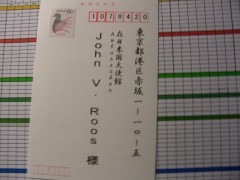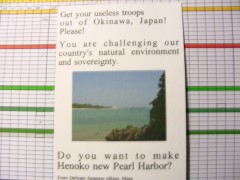02 August 2010
Japan signed, but the U.S., Russia, China did not!
Who contributes to the world peace?
00:13 Posted in Politics, USA issues | Permalink | Comments (0) | Tags: war, military
27 June 2010
German film "Die Welle" It can be true!
The story took place in Highs School in Germany. One high school teacher taught students what the dictatorship (Autokratie) is.
Students never understood what it was and believed things like Third Reich would never happen again.
Then the teacher decided to do psychological experiment in his class and the students' attitude gradually changed in scary way.
The story was not well-done, not convincing althought it was based on a true story.
However, I understand fear of charisma featured in the film because I recently experienced something like that by the man in the below photo.
He has become public icon since fall of 2008 after being dismissed as Japanese Air force chief due to his publicly released essay which justified Japan's past invasion. Details are described in this article. He has published several books since then. I bought one of them.
He is in fact charismatic and neo-fascist-like but at the same time very realistic because of his knowledge gained in his career.
No one wants to be isolated in the society. So people want some kind of symbol to strengthen the unity.
Yes, it can revive as described in the film. Especially those who are not smart, and youngsters can be easily manipulated.
Being attracted to it sometimes makes you feel great like drugs.
We need to be cool about what a learder says in order to avoid tragedy.
11:47 Posted in Deutschland, Film, Politics, Society | Permalink | Comments (0) | Tags: history, nazis
14 June 2010
Sent a postcard to US Ambassador to Japan


22:31 Posted in Ecology, Japan News, Politics, US-Japan relationship, USA issues | Permalink | Comments (0) | Tags: okinawa, military
29 May 2010
Why not just shrink rather than relocate?
Japanese loopy PM accepted humiliating agreement from the U.S.
He turned down the proposal of relocating US marine base, Futenma in Okinawa Prefecture to off the island.
However, if this is going to work out as stated in the agreement is uncertain. Okinawans are now very, very angry with the agreement.
So are a lot of Japanese voters. Maybe after July election, he will resign from prime ministerhood.
New government will then have to rethink the agreement.
But the good thing is because of this turmoil, more and more people have become aware that the U.S. military is not defending Japan at all.
It is not the issue of relocation, it is reducing or getting rid of the bases from Japan.
Even relocation site is changed to Guam or Hawaii, there is another problem.
Can't believe that the U.S. military has been messing islands in the Pacific. (Well, Japanese military did so partially.)
I just found very interesting show on the net. The voices from 3 islands in the Pacific.
Stupid, why not the U.S. government spend vast amount of money on poverty, education or environmental protection instead of messing people and environment of the islands or Iraq, or Afghanistan?
10:27 Posted in Ecology, Japan News, Politics, US-Japan relationship, USA issues | Permalink | Comments (1) | Tags: military, okinawa






